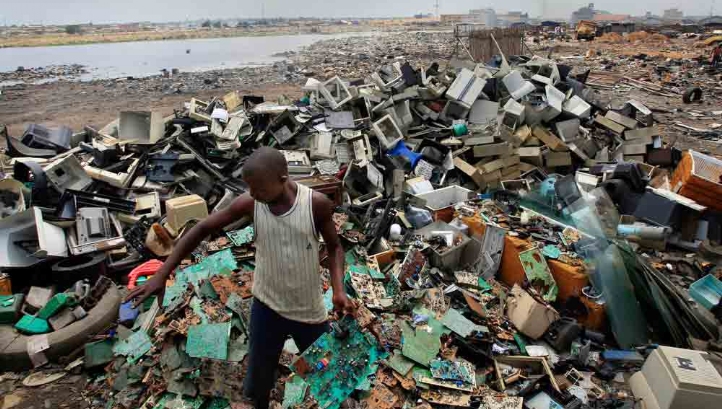Industry body techUK has called on the UK Government to implement tighter regulation of e-waste exports under its Resources and Waste Strategy, after a landmark study into the impacts of Europe’s e-waste crimes on human food chains in Africa.

The Agbogbloshie slums of Ghana (pictured) have been used as an e-waste landfill by illegal exporters
Carried out by anti-toxic chemical pollution bodies IPEN and the Basel Action Network (BAN), the study analysed the levels of brominated and chlorinated dioxins in food products intended for human consumption and produced in Ghana’s Agbogbloshie slum region, where large amounts of illegally exported e-waste streams from Europe are sent. Around 80,000 people in the area are thought to make a living by retrieving and selling materials salvaged from e-waste, such as copper cables.
The study found that eggs laid by chickens allowed to roam the area exceeded the European Food Safety Authority’s (EFSA) tolerable daily intake (TDI) for chlorinated dioxins by 220-fold. Such chemicals are considered highly toxic and carcinogenic. They are able to cause reproductive, hormonal and developmental problems, as well as damage the immune system.
The levels of polychlorinated biphenyls (PCBs) found in the eggs were also found to be quadruple those allowed under EU standards, while levels of hazardous flame retardants and short-chain chlorinated paraffin, commonly used to process PVC and to cut metals, were also “very high”. PCBs have been linked to skin problems, eye damage and certain strains of cancer, including liver, brain and gall bladder.
According to IPEN and BAN, this contamination is primarily caused by people breaking apart discarded electronics to recover metals or burning the plastic components off of such devices to the same end. These processes, the bodies claim, create and release highly toxic by-product chemicals like brominated and chlorinated dioxins and furans, which are considered extremely toxic to humans, even in trace quantities.
In order to address the issue, IPEN, Ban and the Ghana Environmental Protection Agency (EPA) are calling on European nations to adopt policies which bind them, by law, to prevent the release or creation of pesticides, industrial chemicals and other toxic by-products from products and waste they export.
“Europe needs to contend with its own toxic e-waste rather than routing it to developing countries where hazardous chemicals contaminate populations – especially the vulnerable – and the environment suffer as a result of mishandling and existing indiscriminate disposal practices,” said the Ghana EPA’s director of chemicals control and registrar of pesticides Sam Adu-Kumi.
Responding to this call to action, techUK’s head of environment and compliance Susanne Baker said that the body – which represents more than 900 companies across the UK’s technology sector – would support BAN and IPEN’s lobbying efforts for policies which enable easier identification of illegal e-waste exports.
“It is simply not right that products that the public think will be responsibly recycled, via a system paid for by producers of those products, is later found to be illegally exported, circumventing the system entirely,” she said.
“We would support tighter regulation of exporters – as being proposed in the Government’s current review of the packaging waste regime – and greater scrutiny of the sites that exporters claim to be shipping waste to, to ensure that those facilities are fit to handle e-waste.”
Baker confirmed that techUK will be voicing these concerns in its response to the Government’s current consultations on its Resources and Waste Strategy, which will look at changing extended producer responsibility (EPR) regimes to incentivise sustainable product design for waste electrical and electronic equipment and batteries. The results of this consultation are expected to be unveiled by the end of 2020.
Until such legislation is developed and implemented, Barker is urging businesses and individuals to send their end-of-life devices to their local authority’s recycling sites, rather than using private disposal services.
Shutting down e-waste
Research from the United Nations University (UNU) found that more than 44 million metric tonnes of electronic waste was generated globally in 2016, with just 20% documented as recycled.
The analysis anticipates a 17% increase in e-waste by 2021, making it the fastest growing domestic waste stream globally. Between 2014 and 2017, e-waste levels grew by 8%.
In a bid to minimise its contribution to the global e-waste mountain, the UK Government has earmarked more than £8m generated through compliance fees from the Waste Electrical and Electronic Equipment Directive (WEEE) for projects that increase the reuse and recycling of electronic items. The fund will be spread across the next three years, with £1m set aside for research projects, £3m to be invested in behaviour change projects and the remaining £4m to be spent on local projects that boost reuse and recycling.
Sarah George
